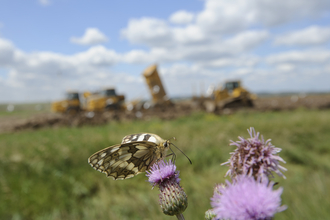No space left for wildlife intensive cereal growing. Photo by Malcolm Smith
Guest blog: Farming goes wild
A riot of poppies and many other flowers in an arable field margin. Photo by John Clarke
The EU’s Common Agricultural Policy (CAP) has been a disaster for farm wildlife. With 70 per cent of England’s land in agricultural use, what happens to our farmland has a huge impact on Britain’s wildlife habitats and the plants and animals they support.
No longer should our lowland farms be so industrialized that they have elbowed out every flowering plant and with them the invertebrate buzz and seed-eating birds once so commonplace. There are other, more sensitive ways of farming.
Take, for instance, Jake Freestone, a Farm Manager in the Cotswolds, one of many farmers I interviewed when I was researching my book, Ploughing a New Furrow: A Blueprint for Wildlife Friendly Farming. He’s growing wide field margins full of arable flowers – poppies and cornflowers included – putting the colour back into crops of spring barley, oil seed rape, peas and beans.
Recent research is showing that such margins can actually increase the yield of the main crop because they support so many pollinators and predatory insects that kill crop pests.
Some farmers with whom I discussed their post-Brexit plans had already changed over to organic farming, exploiting niche markets and farming without synthetic fertilisers and pesticides. Organic farms are proven to support more wildlife. Others were concerned at the overuse of pesticides and that too many hedges had been grubbed out.
Most farmers, though, continue to farm intensively giving little space for wildlife.
Nirvana for breeding farmland birds. Well grown hedges alongside pesticide-free barley. Photo by Malcolm Smith
So how do we make farming more wildlife friendly?
In my view, there needs to be a wholesale conversion of area payments (farm subsidies) into agri-environment schemes – like that being used by Jake Freestone – which pay farmers to manage their land for wildlife and other ‘goods’ such as public access, control of pollution from manure and fertilisers, and flood control. Agri-environment schemes are available to some farmers now but the CAP budget for them is dwarfed by the subsidy budget.
No lowland farmer would then receive any cash support unless they enter such a scheme. I would make entry compulsory – though our Governments probably will not – and based on a farm plan to be drawn up with the farmer so that we don’t have a ‘pepper-pot’ effect where one or two farms improve their land for wildlife in a sea of intensively managed crops.
And we need more encouragement for organic farming and reductions in the use of pesticides known to kill or seriously affect harmless species.
Brexit is set to re-establish a farming ethic that has long faded: land husbandry not land exploitation. This is a once in a generation opportunity to put the wildlife back into our farmed countryside, to support a farming industry producing good quality food but a countryside alive once again with the ascending songs of skylarks, that air-full buzz of a myriad insects and those pointillist specks of colour from hayfield flowers.
Guest author: Malcolm Smith is a biologist, former Chief Scientist and Deputy Chief Executive at The Countryside Council for Wales and has been a Member of the Board of The Environment Agency (for England and Wales). His new book Ploughing a New Furrow: A Blueprint for Wildlife Friendly Farming has just been published by Whittles Publishing.
Read more about BBOWT's work protecting local wildlife

Volunteers given Lifetime Achievement Awards for six decades’ combined work for wildlife
Two nature-loving volunteers have been given Lifetime Achievement Awards for their long-term work at flagship nature reserves in…
Wildlife Trust launches £300,000 appeal to protect ancient woodland in Buckinghamshire
The Berkshire, Buckinghamshire & Oxfordshire Wildlife Trust (BBOWT) has launched its £300,000 appeal to secure the future of…

Why the amendments to the Planning and Infrastructure Bill are not enough
"the amendments don’t make the bill good, they just make it a bit less bad"

